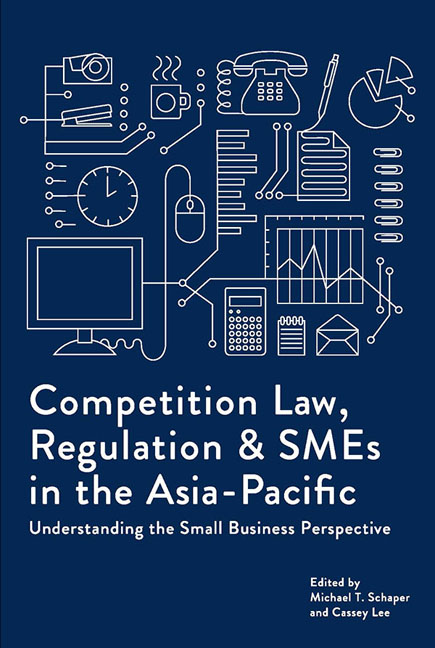 Competition Law, Regulation and SMEs in the Asia-Pacific
Competition Law, Regulation and SMEs in the Asia-Pacific Book contents
- Frontmatter
- Contents
- Foreword
- About the Contributors
- 1 Introduction: Making the Invisible SME More Visible in Competition Policy and Law
- Section 1 Theories And Basic Concepts
- Section 2 Smes And Competition Law
- Section 3 Country Studies
- 12 Competition Law, Regulation, and Trade: Implications for Productivity and Innovation in Singaporean Manufacturing SMEs
- 13 SME Law and Abuse of a Superior Bargaining Position in Japan
- 14 Competition Law, Policy, and Smes in South Korea
- 15 Competition Law Implementation and Smes: Singapore's Experience
- 16 Competition Law and SMEs in Indonesia
- 17 Smes and Malaysia's New Competition Law: Experiences to Date
- 18 Competition Policy and Sme Development in Vietnam
- 19 China's Anti-Monopoly Law and the Sme Sector
- 20 A New Competition Agency Learns to Deal with Smes: The Case of the Hong Kong Competition Commission
- 21 The Regulation of Television Programme Production Contracts under Japan's Subcontract Act
- 22 Small Enterprises and Competition Policy in Pacific Island Countries
- Index
14 - Competition Law, Policy, and Smes in South Korea
from Section 3 - Country Studies
Published online by Cambridge University Press: 05 August 2017
- Frontmatter
- Contents
- Foreword
- About the Contributors
- 1 Introduction: Making the Invisible SME More Visible in Competition Policy and Law
- Section 1 Theories And Basic Concepts
- Section 2 Smes And Competition Law
- Section 3 Country Studies
- 12 Competition Law, Regulation, and Trade: Implications for Productivity and Innovation in Singaporean Manufacturing SMEs
- 13 SME Law and Abuse of a Superior Bargaining Position in Japan
- 14 Competition Law, Policy, and Smes in South Korea
- 15 Competition Law Implementation and Smes: Singapore's Experience
- 16 Competition Law and SMEs in Indonesia
- 17 Smes and Malaysia's New Competition Law: Experiences to Date
- 18 Competition Policy and Sme Development in Vietnam
- 19 China's Anti-Monopoly Law and the Sme Sector
- 20 A New Competition Agency Learns to Deal with Smes: The Case of the Hong Kong Competition Commission
- 21 The Regulation of Television Programme Production Contracts under Japan's Subcontract Act
- 22 Small Enterprises and Competition Policy in Pacific Island Countries
- Index
Summary
Small and medium-sized enterprises (SMEs) have played a significant role in the process of Korea's successful economic development. This is the result of various governmental policies that have been enacted to foster SMEs. As economic circumstances (both internal and external) have changed, the focus of Korean SME law and policies has shifted from unilateral protection or support of SMEs to reinforcing the economic significance and competitiveness of SMEs. Consequently, the importance of competition policies to SMEs has also grown. The main body of competition law in Korea, the Monopoly Regulation and Fair Trade Act (MRFTA), contains certain exceptions applying to SMEs and provisions for their protection. Other legislations have been enacted to ensure fair transactions for SMEs and franchisees. The MRFTA and related laws aim to create a free competitive market to address the anti-competitive and unfair transactional structures that small firms may be exposed to.
Overview
In the process of Korea's rapid and successful economic development, small and medium-sized enterprises (SMEs) have played a major role. This is the result of both specific stipulations in the Constitution, and due to various SME promotion and support policies that have been successfully implemented. But against a backdrop of government-led economic policies that have traditionally prioritized large conglomerate (chaebol) growth, Korean SME policies may be considered relatively lacking, especially when considering the earlier stages of Korea's economic development.
For much of the last few decades, Korean SME policies had been focused on protection policies or on policies in which SMEs played a supplemental role to large conglomerates. More recently, the Korean government has succeeded in amending its policies in response to internal and external changes in national economic circumstances. It has been moving towards reorganizing its legal system to promote and support SMEs so that the economic roles and competitiveness of small firms can be strengthened.
The significance and value of SMEs can vary in different ways, depending on the stage of economic development of the nation involved. SMEs can be considered to have major significance for a rapidly developing country, since promoting them may help build an industrial base, expand employment opportunities, balance development in different regions of the country, and establish a stable social infrastructure.
Information
- Type
- Chapter
- Information
- Competition Law, Regulation and SMEs in the Asia-PacificUnderstanding the Small Business Perspective, pp. 243 - 257Publisher: ISEAS–Yusof Ishak InstitutePrint publication year: 2016